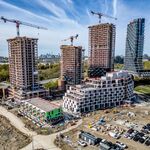urbanfan89
Active Member
Doesn't matter. My parents state their car is for casual use but they drive on an almost daily basis.Insurance premiums are based on the factors you stated, but also on whether you drive to work or not. 'Casual' use is supposed to get a discount, although I am not convinced that is the case.
Once high inflation erodes living standards to the extent personal auto traffic falls dramatically, then we'll have a lot of bike paths.Expensive bike paths? Europe and Brazil are paying nearly twice what we are for fuel and I don't see empty highways/streets there.
Unfortunately not every store has a railway siding in the back.I suppose you are being facetious about everyone going to the factories in their cars. Transportation efficiency was slain on the alter of cheaper goods at Wal-Mart a long time ago. The bean counters decided it was cheaper to ship 500 widgets a day to the plant by truck, rather than warehouse 5,000 widgets shipped by train.
I definitely support incentives to shift freight traffic to rail, but because the rail industry is private it will be seen as corporate welfare.




